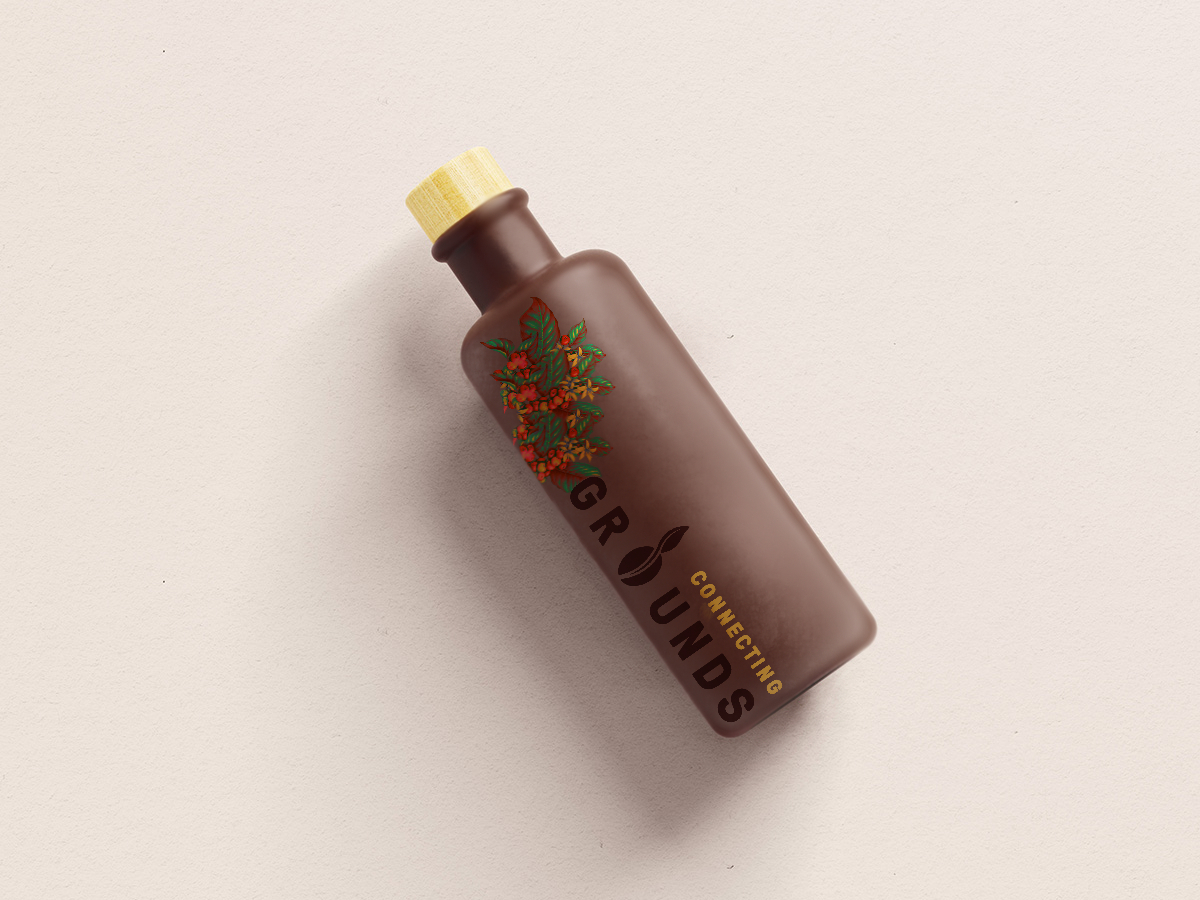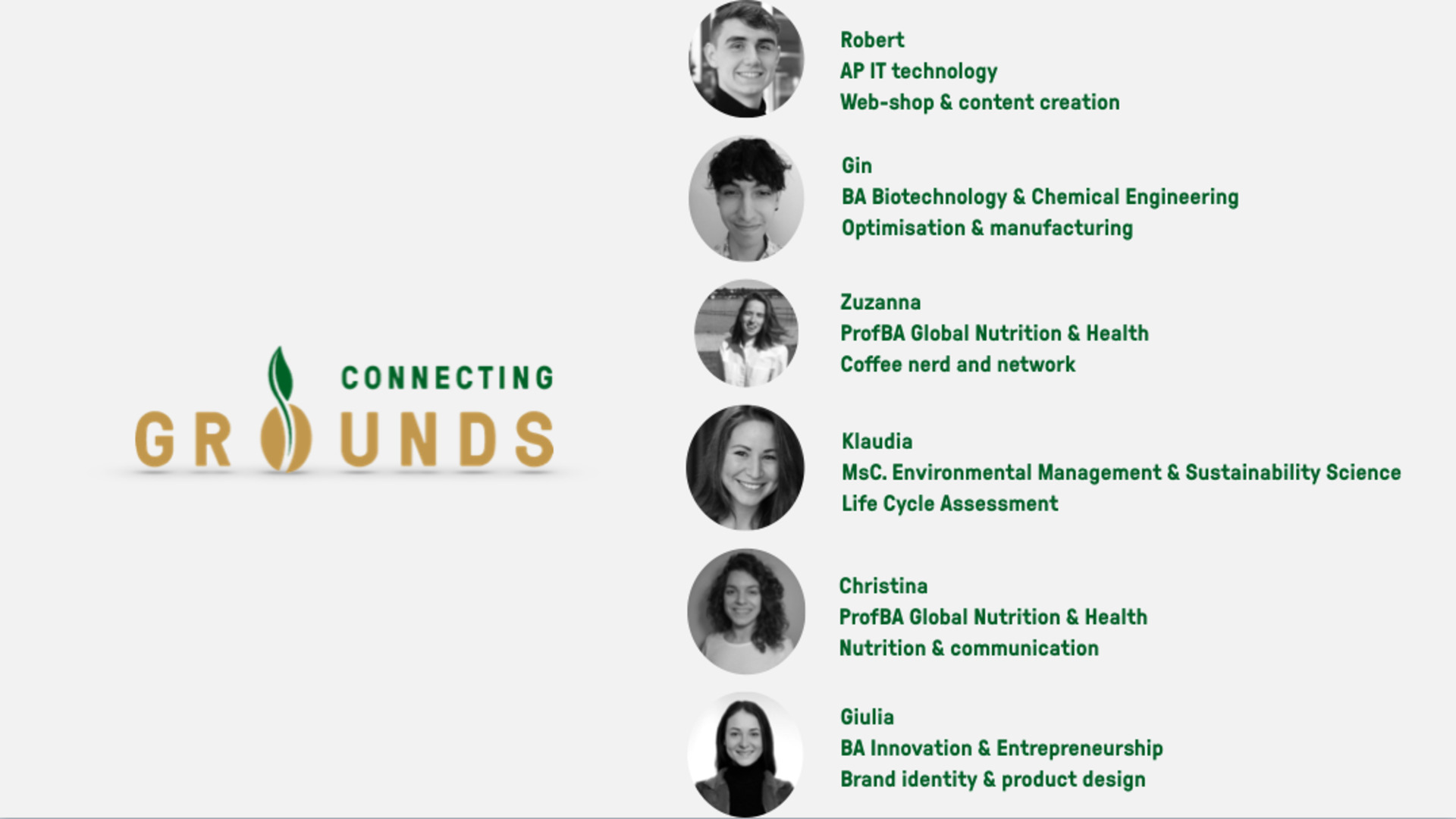Saving the planet one cup at a time
Basic information
Project Title
Full project title
Category
Project Description
Connecting Grounds sees the value in what is, generally, considered food waste: by giving a second purpose to coffee grounds, we want to support food transition towards sustainability while creating delicious products, such as coffee oil and flour. We are a diverse team that aims to support local coffee shops while creating industrial symbiosis and educating businesses and consumers about the “hidden” food waste problem. We believe that this is a good solution for everyone.
Project Region
EU Programme or fund
Description of the project
Summary
Connecting Grounds is a social innovative startup, challenging the unsustainable waste management of spent coffee grounds by upcycling them into nutritious and delicious food products. Six co-founders with six different nationalities and backgrounds, together on a mission to change the world one cup at a time.
We want to encourage a sustainable food transition by giving the choice to the people. They will have a saying on how waste is managed by buying our upcycled products: high-fiber, low-calorie coffee flour and strong aroma coffee oil.
In 2019, Denmark reached a total amount of approximately 21,800,000 tons of waste between households and businesses. Denmark consumes more than 50,000,000 kg of coffee per year that is part of the food waste. Most of the coffee waste ends up as biogas. This is where we decided to act.
We will initially start by collecting the coffee grounds from local coffee shops, and eventually scale up to the instant coffee industry and office spaces (fx. the municipality, with which we are in touch).
We will sell our coffee oil to the flavouring industry, where its chocolaty, nutty and roasty notes are highly valuable in the making of chocolate, syrups and caramels.
When it comes to the coffee flour, we will start by supplying and selling the coffee shops, by closing the loop and advocating a circular economical approach.
The aesthetics and unique taste of the end-products will be our trademark and will advertise us back.
Apart from having their CO2 footprints lowered, our providers and buyers will be able to include us and our values in their own storytelling and consumer image. By partnering with us, they support our activism and action against the unsustainable management of food waste.
Our goal is to eventually scale up our production to supply bigger markets with our products, so it is available for every consumer.
Key objectives for sustainability
Transition to a circular food system. Europe accounts for more than 30% of global coffee consumption, being the largest coffee market in the world. Coffee as an exported commodity, cannot be sourced locally, significantly contributing to the ecological footprint. Our operations aim to reduce the environmental impact of our coffee habits by offering alternative products to existing ones, where the production is tied up with unsustainable agriculture or processing practices. For example, coffee syrup made out of raw coffee beans could be directly used for human consumption or innovation of the flour market, offering alternatives without using any arable land or other additional resources. Based on the circular concept, our products are closing the nutrient loop by re-using waste from the coffee for human consumption, keeping the high value of the bio-chemical composition of the material.
From Farm to Fork strategy. Connecting Grounds' product portfolio is an entrepreneurial initiative to implement the Farm to Fork Strategy, specifically the Waste Framework Directive adopted on the 30th of May 2018. Member states are obliged to provide incentives of the action plan towards the reduction of food waste by 2023. Our mission is to help entities involved in the coffee industry to be proactive with the transition into sustainable waste handling.
Sustainable Development Goals. Feeding 9.6 billion people by 2050 without further exploitation of the natural services and expansion of arable land requires the food system to make changes beyond the sustainability mindset. As the European community, we need to build a food supply chain that regenerates body health, strengthens food sovereignty of rural and urban communities, and contributes to the European circular competitiveness. In our startup, we work towards the reduction of food waste (goal no. 2), sustainable cities (goal no. 11) and responsible consumption and production (goal no. 12).
Key objectives for aesthetics and quality
Aesthetics as co-creation. Co-creating the design of the products together with our customer (coffee houses and end-consumers) is our key focus, as we are introducing on the European market a novel food which was not available previously. We are customer-focused and, therefore, want to make the customers be part of the process, also when it comes to the packaging and recipes. We, therefore, want to promote home baking, as low impact, local entertainment with mental health benefits.
Aesthetics as value driven solutions. Our values are portrayed by a product that is healthy, nutritious, tasty and good for the environment. We aim to make those who buy the products feel like they are part of a change towards a better food system. We are also creating a hybrid solution, which includes local business owners, and their customers in our solution. Together, as a circular coffee community, we are including 100% of the coffee biomass as a valuable material, contributing to the European resourcefulness.
Coffee oil and coffee flour, as food, have the power to convey a message through key aspects of the aesthetics, making food transition an exciting and innovative topic to share among friends, families and communities to create a different type of experience, beyond its functionality.
Aesthetics’ communication through packaging and social media. Connecting Grounds will educate customers about upcycling food, working towards increasing the European Consumer acceptance of value-added surplus products. This is also strictly connected to our mission towards a more sustainable consumption and healthier nutritional choices from individuals that will be portrayed on our social media and packaging.
Key objectives for inclusion
Coffee as beverage that unites people. Coffee is for everyone and we want every coffee drinker to become part of the sustainable food transition. For that, we plan on scaling up our production of coffee flour, so we can reach bigger markets.
We want to eventually fit any type of budget, for it is our goal to raise awareness about the unsustainable management and enormous quantities of food waste produced. What is more, we take celiac people into account by producing a flour that is gluten-free.
Ethics in the food supply chain. Being a value-driven startup, we make sure that all our products and processes are ethical. Firstly, food is a primary need for all of us and, therefore, it is our mission to ensure that everyone can access it. Secondly, not only do we care about the environment, but also its inhabitants and their rights. We advocate for a vegan, plant-based and cruelty-free lifestyle.
Inclusion as a drive for our team. Inclusion is engraved into the core of our company. All six of us have different nationalities, backgrounds, sexualities and gender identities. We believe that accepting diversity is not enough, so we always aim to include it in our plans and all thrive together. As feminists activists, we advocate for empowering women’s leadership and embracing all cultures, gender and sexual identities.
With regards to the future, the mentioned scaling-up will, of course, require more workers. We want to work together with social inclusion programs and welcome the workers into our understanding and non-judging environment. We will actively listen to them to keep improving and adapting to their specific needs and keep building Connecting Grounds together.
Innovative character
What characterises Connecting Grounds is the focus on both radical and incremental innovation when it comes to products, production, scalability, inclusion and aesthetics.
No-food miles. The innovation behind the products is presented by the fact that our products, unlike others, will not require any arable land, will be local, and will emphasise on by-products in order to reuse every part of the “waste”.
Circular production. When it comes to the production, we aim to reuse and create. In other words, lower waste production, reduce food waste and work with specific machineries that focus on minimising the CO2 emission in order to do so.
Sustainable scaling. Our scalability process is all about innovation: we consider coffee as the beginning of the food transition towards sustainability, but not as the last material to be upcycled. Connecting Grounds highly believes in upcycling any food waste that is possible to be “saved”. Therefore, we aim to increase our product portfolio by involving other “waste ingredients” that are still nutritious. In addition, we also believe that our concept can be adopted in further places in Europe, by adopting a franchise approach.
Aesthetics in connection to innovation. Lastly, when it comes to aesthetics, we aim to use innovation to make products that are physically appealing, but also functional while still caring for the ecological footprints that we leave behind with the packaging.


